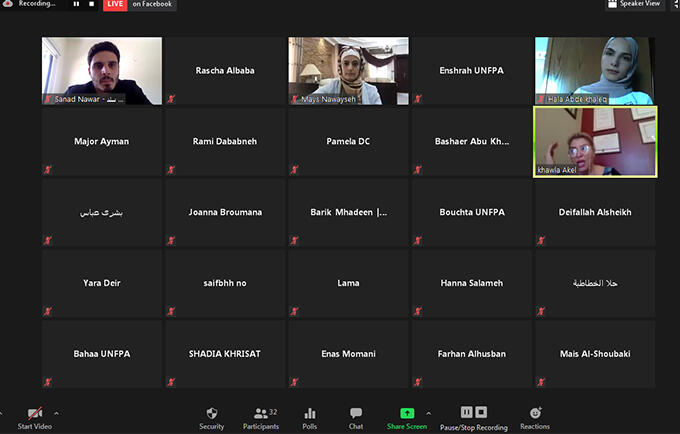Conflict-related Sexual Violence: What works for the elimination of CRSV?
An interactive session with experts and young people
On the occasion of the International Day for the Elimination of Sexual Violence in conflict, which is celebrated on the 19th of June, UNFPA Jordan in collaboration with the Jordan Youth Peace and Security 2250 National Coalition organized an online interactive session to mobilize young people and representatives of youth organizations and networks on CRSV and on how sexual violence impacts the lives of young people and their communities and discuss with practitioners and experts what works to put an end to it.
Link to video: https://www.youtube.com/watch?v=z1hUFv3X9Yw
In the opening remarks Ms. Enshrah Ahmed, UNFPA’s Representative reaffirmed UNFPA commitment to achieve three zero by 2030, that is zero preventable maternal mortality, zero unmet needs for family planning and zero gender-based violence even despite the COVID-19 and challenges for service delivery.
Facilitated by Mr. Sanad Nawar, a youth social and political activist in Jordan, the dialogue hosted four panelists: Mr. Ayman Al-Refaie, Chief of section of criminal sexual exploitation on children in the internet at Family Protection Department in Jordan, Ms. Khawla Al-Akel, GBV Specialist at UNFPA Yemen, Ms. Mays Al-Nawayseh, Protection and Gender Adviser and Ms. Hala Mahfouz, a young activist on the rights of Persons with Disabilities. With the participation of over 30 young people and practitioners from different youth networks the dialogue stressed on the main obstacles that prevents survivors of sexual violence from reporting, such as social stigma, social norms, lack of confidence on judicial responses lack of knowledge on the rights of survivors and lack of information on how to seek help and the role of young people in fighting these obstacles.
During COVID-19, social media platforms played a major role in sharing information on provided services for survivors as panelists affirmed; stating also the important role of young people on using those platforms to raise awareness on types of sexual violence, available services for survivors, the importance of reporting and on sexual education.
“Now it’s your turn, change starts with you!” as Ms. Khawla Al-Akel stated when urging young people to fight social norms that stand against human rights in Jordan and to break the silence about sexual violence.


